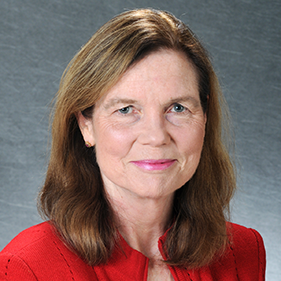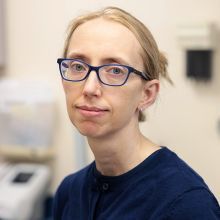Welcome from the Fellowship Director

Greetings,
Thank you for your interest in our Geriatric Medicine Fellowship! Our one-year program is set in the nation’s capital and reflects the diverse communities and opportunities of the city around us. We provide experience and training in the world of geriatric medicine and hope to help you find the best career track for you.
We emphasize clinical excellence and exposure to the full range of healthcare models. We prize resiliency, self-care, team-work and fun!
Fellows become experts in transition management and interdisciplinary leadership. We work with faculty, fellows, residents and medical students in all specialty areas to care for our patients and their families. Welcome to the best year of your professional life, and we look forward to meeting you!
Elizabeth L. Cobbs MD, FACP, AGSF, FAAHPM
Geriatric Medicine Fellowship
The ACGME accredited George Washington University School of Medicine and Health Sciences Geriatric Medicine Fellowship provides one-year training and experience in an unsurpassed range of clinical settings. It promotes physician leaders with particular expertise in teaching, quality improvement and interdisciplinary team-building. Training settings include geriatrics clinics, memory disorders clinic, home care programs, inpatient rehabilitation, acute care hospital, hospice, assisted living and skilled nursing facilities. Weekly core conferences, quality improvement projects and personal mentoring prepare fellows to be expert clinicians, master teachers and medical directors.
- Locations
-
Fellows work and learn in basic and advanced settings, assuming increased levels of responsibility over the Fellowship year
- Washington, DC, VA Medical Center: The VAMC has an in-depth program in Geriatrics, Extended Care, and Palliative Care. Fellows have clinical rotations in the Geriatrics Clinic, Geriatrics and Palliative Medicine Consult Service, Community Living Center (nursing home care unit) and Inpatient Rehabilitation service, as well as Home Based Primary Care, Geropsychiatry, and ALS clinic. Seven geriatricians serve as primary faculty in collaboration with multiple interdisciplinary teams to provide a tremendous variety of clinical and academic exposure.
- George Washington University School of Medicine and Health Sciences: Fellows work in both inpatient and outpatient settings seeing a diverse patient population. Inpatient geriatrics and palliative medicine consultation service and continuity geriatrics clinic provide invaluable opportunities to hone skills in educational and interdisciplinary leadership. A Memory Disorders Clinic sharpens skills in diagnosis and treatment of dementia and other memory disorders. Wound Care Clinic trains fellows to become experts in wound management.
- Home Visits: Fellows gain exposure to home care through the GW Medical Faculty Associates (MFA) Medical House Call Program and the Washington DC VA Home-Based Primary Care Program
- Capital Caring Inpatient Hospice: Fellows spend two weeks in the inpatient hospice unit of the largest regional hospice organization and gain experience in acute symptom management and end-of life care.
- Thomas Circle Residences: Fellows provide care to residents in a continuity nursing home and assisted living practice to learn how to help patients receive needed services in the most independent setting possible.
- Didactic and Interactive Teaching
-
Weekly web-based interactive conference topics include:
- Geriatric Medicine and Palliative Medicine
- Grand Rounds
- Palliative Care topics
- Evidence Based Medicine Conferences
- Just In Time Journal Club
- Ethics Topics
- Geropsychiatry
- Quality Improvement Projects
- Morbidity and Mortality
- Skill Building
- Geriatric Medicine topics
- Autopsy Conferences
Other regular conferences include:
- Weekly lunch conference at GW
- Brown Bag Board Reviews
- Geriatric Syndromes Conference at the VAMC
- GW Medicine Grand Rounds
- VA Medicine Grand Rounds
- Weekly Life Conference at VAMC
Integrative Medicine:
All Fellows will have exposure to Integrative Medicine. A special track for up to two Fellows will include extended participation in our established GW Center for Integrative Medicine.
Scholarly Work
While a research project is not required, faculty mentorship for scholarly work is abundant. All fellows are encouraged to develop at least one project for publication or presentation at the annual meeting of The American Geriatrics Society.
Quality Improvement Projects
Fellows are mentored by faculty to participate in Quality Improvement Projects in collaboration with interdisciplinary teams throughout the year.
All content on this website is © and cannot be reproduced in any form without written permission.
Welcome from the Fellowship Director

Greetings from the Hospice and Palliative Medicine fellowship at George Washington University. Our one-year, university-affiliated program is in the heart of the nation’s capital city and makes the most of its remarkable setting. Fellows are afforded the opportunity to practice in multiple settings with expert clinicians and educators, while enjoying the culturally rich and diverse atmosphere of our vibrant surroundings. Fellows develop and hone skills in communication, managing serious illnesses and their associated symptoms, interdisciplinary team participation and leadership, education and scholarship, quality improvement and safety, and personal resiliency and self-care. I look forward to meeting and learning with you!
Sincerely,
Laura Hofmann, MD
Hospice and Palliative Medicine Fellowship
The ACGME accredited George Washington University Hospice and Palliative Medicine Fellowship is a one year program that offers experience learning from expert faculty in varied clinical settings and prepares fellows as physician leaders, master teachers and quality improvement experts.
Fellowship Training Partners
Fellows work and learn with expert faculty across a variety of settings, including:
The George Washington University Hospital: As part of an interdisciplinary Inpatient Palliative Medicine consultation team and during Pain Medicine and elective rotations, providing holistic care to a diverse population.
Capital Caring Health: As integral members of Inpatient and Home Hospice teams with one of the nation's oldest and most well-respected non-profit hospices.
Washington DC Veterans Affairs Medical Center: Integrated into Inpatient Palliative Medicine, Outpatient Palliative Medicine, Home-Based Palliative and Primary Care, and Hospice in Long-Term Care teams that provide person-centered care in the context of the veteran experience.
National Institutes of Health: As fellows on the Inpatient and Outpatient Palliative and Pain Management team, receiving unparalleled exposure to their integrative and interdisciplinary team models for diverse patients from around the world receiving cutting-edge whole-person care.
Children’s National Medical Center: Experiencing the PANDA Palliative Care team's approach to wrap-around care for infants, children, and young adults with serious illness.
Goodwin House and Hospice: Providing continuity care for seniors across the continuum of independent, assisted-living, and hospice care.
Didactic and Interactive Teaching
A Weekly web-based interactive curriculum covers the following topics over the course of the year:
- Fundamentals of Hospice and Palliative Medicine
- Evidence-Based Medicine
- Medical Ethics
- Journal Club
- Quality Improvement
- Board Review
- Wellness and Resilience
- Medical Humanities
Additionally, while on rotations at affiliated sites, fellows attend academic Grand Rounds presented weekly at the DC VA Medical Center, George Washington University Hospital, Children's National Hospital, and the National Institutes of Health.
Scholarly Work
Faculty mentorship for scholarly work is abundant. All fellows develop at least one project for publication or presentation at the Annual Meeting of The American Academy of Hospice and Palliative Medicine.
Quality Improvement Projects
Fellows are mentored by faculty to participate in Quality Improvement Projects in collaboration with interdisciplinary teams throughout the year.
Eligibility Requirement
Must be board eligible or board certified physicians with backgrounds in family medicine, internal medicine, psychiatry, anesthesiology, neurology, physiatry, and emergency medicine. J1 visas sponsored only.
Application Information
Applications are only accepted through the Electronic Residency Applications Service (ERAS).
The candidate must register for both ERAS and the National Residency Match Program (NRMP). A candidate who has not registered with the NRMP cannot be considered during the ranking process. It is very important to remember to register.